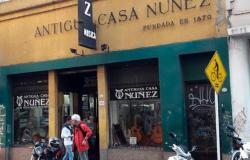There are two decades of work in which Gepe, named Daniel Riveros, has become one of the references of Chilean music.
There are different fronts from which he has built a renowned career: pop, cueca, bachata, just to mention a few.
Last release
His most recent release, “Playaplaya”, an ode to the heat, love and temperature of a day at the sea translated into a single that he defines as “Bolero-soul” It is already on streaming platforms.
Having just arrived from Mexico, Riveros is preparing for the release of his tenth full-length work almost twenty years since his debut as a soloist with “Gepinto” in 2005.
Interviewed by The Bewilderment, Gepe, one of the emblematic names of Chilean music, sand projects into a new artistic stage and talks about the medley of sounds with which he has gained an audience that follows him around the world, about respect as the greatest requirement for collaboration and the place of alternative music in a world focused on urban sound.
-How was the work behind the new single?
-It’s a song from a fairly medley album. There are a lot of things that sound like different bridges or musical inspirations: this one in particular has to do with bolero and soul. It’s very funny. It’s a cliché, but I dreamed the melody along with part of the lyrics and that caused me enough fun and enthusiasm to be able to record it. I was falling asleep and on that intermediate path the lyrics and the melody appeared.
There are phrases in the song that have to do with other songs, for example, “Para amar” (from Los Prisioneros) which talks about “the frozen winter and that the next one is going to be maybe colder” and that kind of thing. The central image of the song is in the idea that no matter how cold the summer was or the last winter was very cold, or no matter how cold the water is, you and I are fine right now, We are fine because we love each other, we respect each other, we find that we are good people, because we trust each other.
-This album would be number 10 of your career, what has the work behind it been like? What importance do you give to this milestone in your career?
-This album matters a lot to me, I mean, I care for the simple reason that I did it with great pleasure. I have to confess, I have made albums in which I didn’t have much control over what was being done, but that doesn’t make those albums worth less or more, but at least I didn’t have those moments of uncertainty at all in this work, and that made me enjoy creation much more, from the moment of composition to recording. The production too.
I enjoyed it a lot, so in that sense it’s great because after nine albums and having lived nine lives like cats, now comes this tenth album. I still have the same interest as always in making music, creating it and inventing new or not so new things. Make songs that are a little worthwhile. Well, I made this album with total effort, darling, so I love the fact that it’s the tenth.
When I was doing the third (Audivisión, 2010) I didn’t think I was going to reach a tenth with this enthusiasm, So I congratulate myself on that. The album is good, there are songs that are quite decent, so to speak.
I am very happy. And well, the album would come out in a few more months.
-How are pop and alternative styles claimed at a time when what is most popular is the urban genre?
-I think music happens beyond the industry, beyond anything else. More music in general is being listened to now than at any other time in Chile, I am referring to Chilean music and I get the feeling that it is happening outside as well. I was in Mexico last week, where in several places they played urban Chilean music in some club places. But also on some Mexican radio they mentioned several names from different generations to me, from Los Tres, Los Bunkers to Myriam Hernández, also Javiera Mena, Alex Andwanter. Several names always appear and I love that and it gives me the feeling that this is more so now than ever.
I have the feeling that the urban music is now referring to itself. At first there was an idea of looking like Puerto Rican or Central American, but it seems not anymore. I think that Argentinians are creating a very Argentine urban style and Chileans are creating a very Chilean urban environment; Mexicans the same. That’s cool and I love that Chilean music is heard, whatever style it is. I don’t have any problem with that, on the contrary.
The place of Chilean alternative or indie music is the one it has always had and the one it will always have, probably in a lower volume place. I am sure that there will never be someone who plays indie music at full speed with the windows down in the car or on a bicycle with a speaker. Indie alternative music always has its place and I think that’s fine.
I don’t worry about someone taking my space or me taking someone’s space. I think music is for all those kinds of things, for a lot of styles and forms.
-What is essential for you when doing a featuring?
-I would say special admiration or affection for that artist, whoever he or she may be, regardless of whether or not you previously know him or her. I think I’ve always worked with people I admire and know, or don’t know and admire. I have had the pleasure that several invitations were accepted. It makes me very proud to have composed or recorded. The nice thing is that they grow in context too, because when the song is released with Natalia Lafourcade (Shyness), The song is as much to talk about as the collaboration itself, and I love that, I think that solo work, I don’t know if it’s like that with bands, but at least solo work in collaboration with others is enriched and makes one feel less alone.
-What are the genres that you need to explore? You have gone through many rhythms…
-I think I have only made one genre album, which is Imaginary Folklore, which has a central musical theme. On that album there are everything from cuecas, tonadas to cacharpayas, all linked to the figure of Margot Loyola. I think it’s the only album I made that was more orthodox. There is another album called Estilo Libre, which is from the year that has bachata, rap and guayno.
This new album draws from several sources at the same time. In fact, the first song we released, “Paloma”, has Andean music and charango. At the same time he has another foot in the Central American rhythmic part in the percussion. I think it’s a progressive pop album, this idea that the parts are not repeated, that there is an idea that songs are like assemblages of things. There are not many songs that have several parts within them, I learned that from a Café Tacuba album called “Sino” or from works that have a pop sensibility, but they assemble different parts and create a song that essentially is pop. But it’s a little more than that too or a little less than that I don’t know, so that’s what I call progressive. This album also has many recordings between the songs, which I don’t know if they refer so much to a pop song itself, which is why I say that this is a progressive pop album.
-What can we expect from a new stage for Gepe after this tenth album?
-I believe that this album is undoubtedly ua new stage. The last awareness of renewal, seriously, was in 2020 with the album Ulysses, but it wasn’t completely either. I’ve been in the process for quite some time looking for ideas here and there.
It is an album that is not short, it has quite a few songs and quite a few proposals: some more innovative than others. I think there are several songs that are a little outside the norm of what I have traditionally done. I love that and I think that this is without a doubt for me like the first album, really. I always say the same thing, because I feel that way. Every album I release is as if it were the first, but this one definitely feels like a first album and I have the same enthusiasm, but probably more renewed and fresher.






